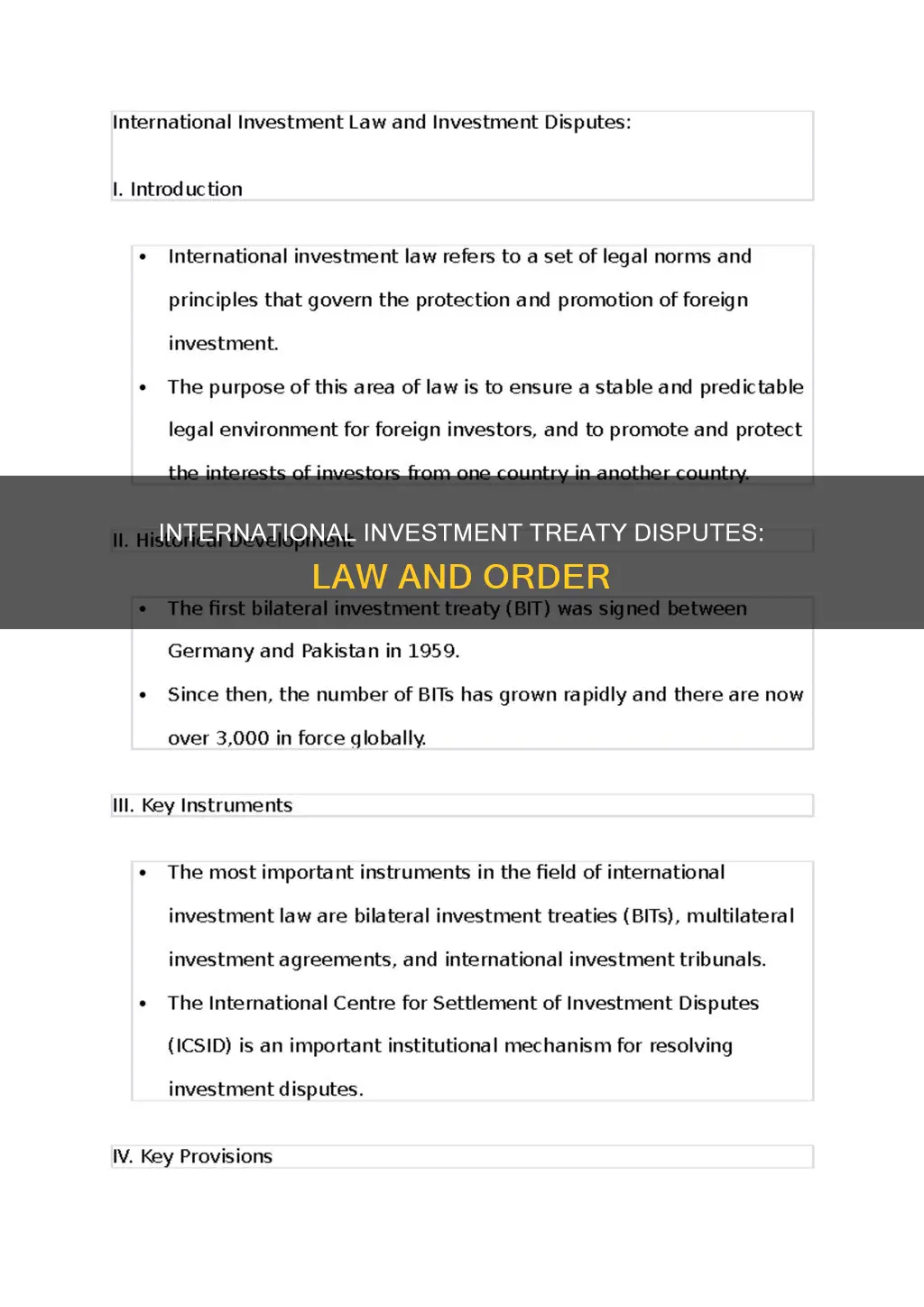
International Investment Treaties (IITs) are bilateral or multilateral treaties that commit state parties to providing foreign investors from other state parties with specific standards of treatment. These treaties grant foreign investors certain protections and benefits, including the ability to resolve disputes with host states through Investor-State Dispute Settlement (ISDS). The three main sources of law in investment treaty arbitration are investment treaties, general international law, and municipal law. IITs often provide for the applicability of international law and, in some cases, municipal law. When interpreting treaties, tribunals use the 1969 Vienna Convention on the Law of Treaties (VCLT) and consider the ordinary meaning of the terms, the context in which the provisions appear, and the object and purpose of the treaty.
| Characteristics | Values |
|---|---|
| Nature | A web of treaties between sovereign states |
| Applicable Law | Depends on the agreement between disputing parties, or the arbitration rules applied |
| Party Autonomy | A fundamental principle in investment treaty arbitration |
| Sources of Law | Investment treaties, general international law, and municipal law |
| Primary Source of Law | The investment treaty itself |
| Other Sources of Law | Bilateral and multilateral treaties, customary international law, and municipal law |
| Dispute Resolution | Alternative dispute resolution mechanisms, such as international arbitration under ICSID |
| Number of BITs | Over 2,500 |
What You'll Learn

The role of the International Centre for Settlement of Investment Disputes (ICSID)
The International Centre for Settlement of Investment Disputes (ICSID) is an autonomous, multilateral arbitration institution established in 1966 to facilitate the resolution of legal disputes between international investors and states. ICSID is headquartered in Washington, D.C., and is part of and funded by the World Bank Group.
ICSID's primary role is to provide a neutral platform for resolving investment disputes between international investors and host states. It offers institutional support and procedural guidance to conciliation commissions, tribunals, and other committees handling these disputes. ICSID does not conduct arbitration or conciliation proceedings itself but provides administrative and technical assistance to ensure fair and efficient dispute resolution.
ICSID's convention, titled "The Convention on the Settlement of Investment Disputes between States and Nationals of Other States", serves as a multilateral treaty formulated by the executive directors of the World Bank. The convention establishes ICSID as an independent, depoliticized, and effective dispute-settlement institution, promoting international investment by providing confidence in the dispute resolution process.
ICSID's two main instruments for resolving disputes are the ICSID Convention and the ICSID Additional Facility. These instruments provide the procedural framework for arbitration, conciliation, and fact-finding proceedings. The ICSID Convention is the primary source of procedural rules, while the Additional Facility Rules authorize the ICSID Secretariat to administer certain types of proceedings that fall outside the scope of the Convention.
ICSID's role is to ensure that disputes are handled in accordance with the applicable laws and rules agreed upon by the disputing parties. The ICSID Convention stipulates that the tribunal shall decide a dispute by following the rules of law agreed upon by the parties. This respect for party autonomy is a fundamental principle governing investment arbitration proceedings.
In addition to its dispute resolution role, ICSID also performs advisory activities and maintains several publications. It promotes greater awareness of international law on foreign investment and the ICSID process through publications such as the "ICSID Review: Foreign Investment Law Journal". ICSID also offers research resources, such as its database of Bilateral Investment Treaties, which is a valuable tool for investors and states seeking information on investment protection and enforcement.
ICSID's governance structure includes an Administrative Council, consisting of one representative from each contracting member state, which approves rules and regulations, conducts case proceedings, and approves the centre's budget and annual report. The day-to-day operations of ICSID are managed by its secretariat, led by the Secretary-General, who is responsible for legally representing ICSID and serving as the registrar of its proceedings.
Exploring Non-Cash Investments: Beyond the Basics
You may want to see also

The applicability of municipal law
The Role of Municipal Law
Municipal law, particularly that of the host state, often plays a significant role in international investment treaty disputes. While the underlying treaty and international law are typically the primary sources of substantive law, municipal law can be applicable in several ways. Firstly, many treaties specifically stipulate the applicability of municipal law, demonstrating its importance in resolving investment disputes.section
Treaty Provisions and Municipal Law
Incidental Issues and Municipal Law
Certain specific or incidental issues within an investment treaty dispute may require the application of municipal law,section irrespective of whether the main issues are governed by the treaty or international law. For example, municipal law may be relevant for determining the existence and scope of the rights comprising the investment that the investor seeks to protect. Additionally, some treaties provide protection only to investments made "in accordance with" the host state's laws, necessitating an assessment of the legality of the investment under the host state's municipal law.
Nationality, Corporate Governance, and Municipal Law
Municipal law may also come into play when determining the nationality of the investor, which is necessary to invoke the protection of an investment treaty. In cases where the investor is asserted to have dual or multiple nationalities, tribunals may need to refer to the municipal law of multiple states. Furthermore, issues pertaining to the investor's legal status, corporate actions, and corporate governance are typically governed by the municipal law of the investor's home state.
Umbrella Clauses and Municipal Law
Municipal law can also be relevant in the application of "umbrella clauses" in investment treaties. Umbrella clauses typically require a host state to observe any obligation it has assumed with regard to specific investments in its territory. In such cases, tribunals may resort to the municipal law of the host state or other applicable laws to determine whether a contractual commitment has been validly established and to assess issues related to its execution.
Conflicts Between Municipal Law and Treaty or International Law
In cases where conflicts arise between the provisions of an investment treaty or international law and municipal law, the general principle is that the treaty or international law should prevail. This is based on the well-established rule that states cannot invoke the provisions of municipal law to justify their failure to perform a treaty. However, municipal law may be applied concurrently and in parallel with treaty or international law in certain circumstances.
Challenges and Considerations
Utilizing 0% APR Credit Cards for Investment Opportunities
You may want to see also

The fair and equitable treatment standard
International investment treaties (IITs) are bilateral or multilateral agreements that commit state parties to providing foreign investors from the other state parties with specific standards of treatment. One of the most frequently contested provisions in investor-state arbitration is the "fair and equitable treatment standard".
The obligation of the parties to investment agreements to provide each other's investments with "fair and equitable treatment" has been interpreted in various ways by government officials, arbitrators, and scholars. Discussion of this standard has primarily centred on whether the required standard of treatment is measured against the customary international law minimum standard, a broader international law standard that includes other sources such as investment protection obligations generally found in treaties and general principles, or whether the standard is an autonomous, self-contained concept in treaties that do not explicitly link it to international law.
The "fair and equitable treatment" standard has sometimes been equated with the international minimum standard of treatment under customary international law. However, at other times, it has been viewed as an autonomous and evolving treaty standard, leading to discussions about whether it should form a self-standing rule of customary international law. The specific wording of the particular treaty, its context, negotiating history, and other indications of the parties' intent all play a role in determining the proper interpretation of the "fair and equitable treatment" standard.
The primary source of substantive law in investment arbitration is the investment treaty itself, supplemented by both general international law and the municipal law of the host state. Treaties often provide various means of substantive protection for the investor, such as the host state's obligation to provide fair and equitable treatment. When interpreting treaties, tribunals refer to the means of interpretation provided in the 1969 Vienna Convention on the Law of Treaties (VCLT). Tribunals scrutinise the ordinary meaning of the terms of the treaty and consider the context in which substantive provisions appear, construing the relevant rule in conjunction with other treaty standards and the object and purpose of the treaty.
In summary, the "fair and equitable treatment" standard in international investment law is a complex and evolving concept that is interpreted differently depending on the specific treaty and its context. It is a key provision in investor-state arbitration, and its interpretation has significant implications for the rights and obligations of investors and host states.
Preparing a Cash Flow Statement: Investing Activities Guide
You may want to see also

The right to transfer funds
The specific wording of transfer provisions can vary significantly across different investment protection treaties. Some treaties contain concise formulations, while others include more extensive provisions that cover examples of the types of transfers allowed and any exceptions to the transfer right.
It is worth noting that the right to restrict the transfer of funds falls within the sovereignty of states under general principles of international law. This means that, in the absence of treaty provisions, imposing restrictions on the transfer of funds is not considered an internationally wrongful act, as it is part of the government's right to regulate and protect its financial and monetary system.
When it comes to resolving disputes related to the transfer of funds, there have been a limited number of cases handled by arbitral tribunals. Tribunals have granted breaches of transfer provisions in cases where the respondent's authorities prevented the sale of vessels, froze investor bank accounts, refused to release foreign currency, or introduced bans on distributing investor profits. On the other hand, tribunals have rejected breach of transfer provision claims when claimants failed to follow established procedures for requesting a transfer or when the claim fell outside the tribunal's jurisdiction.
Webull's User Age Limit: Who Can Invest?
You may want to see also

The ability to require foreign investors to adopt inefficient and trade-distorting practices
International Investment Treaties (IITs) are bilateral or multilateral treaties that commit state parties to provide specific standards of treatment to foreign investors from other state parties. IITs grant foreign investors certain protections and benefits, including the ability to resolve disputes with host states through Investor-State Dispute Settlement (ISDS).
IITs typically provide foreign investors with substantive protections, such as the right to be treated as favourably as their local competitors and other foreign companies. Foreign investors are entitled to the better of national treatment or most-favoured nation (MFN) treatment, subject only to certain limited and specifically described exceptions.
IITs also establish clear limits on the expropriation of investments and entitle foreign investors to seek compensation. Expropriation can occur only in accordance with international law standards, meaning for a public purpose, in a non-discriminatory manner, under due process of law, and with prompt, adequate, and effective compensation.
Additionally, IITs include broad guarantees of treatment for investors in accordance with international law. Host countries typically promise "fair and equitable treatment" and "full protection and security" for investments and promise not to engage in "arbitrary" or "discriminatory" decision-making.
One of the key protections provided by IITs is the ability to limit the ability of host governments to require foreign investors to adopt inefficient and trade-distorting practices. For example, performance requirements, such as local content or export quotas, are often prohibited. Investors protected by IITs can purchase competitive foreign-produced components without undue restriction on inputs in their production of various products. They can also import other foreign-produced products for distribution and sale in the local market. They cannot be forced, as a condition of establishment or operation, to export locally produced goods.
By limiting the ability of host governments to impose inefficient and trade-distorting practices, IITs help to create a predictable environment guided by market forces and promote fair and equitable treatment for foreign investors.
QuickBooks: Recording Non-Cash Investing and Financing Activities
You may want to see also







